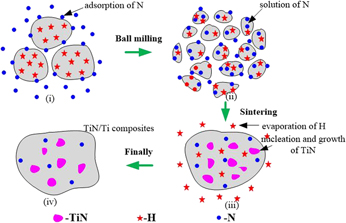Article contents
Nano-sized TiN-reinforced composites: Fabrication, microstructure, and mechanical properties
Published online by Cambridge University Press: 19 July 2019
Abstract

Nano-sized TiN-reinforced Ti metal matrix composites were fabricated by powder metallurgical route, which includes high-energy ball milling pretreatment and subsequent hot-press sintering treatment. The phase composition and microstructure of the sintered samples were characterized by X-ray diffraction, scanning electron microscopy, and transmission electron microscopy. Results showed that N2 was absorbed and solubilized into TiH2 by milling pretreatment, and TiN was formed during sintering process and was fine to a grain size of 20–100 nm. The final phase composition of the composites was αTi, βTi, and TiN with solution N in matrix. Mechanical tests showed that with increasing milling time, the hardness of the composites increased by 31, 58, 93, and 101% compared with pure Ti. The compressive strength initially increased and later decreased to 2440 and 2120 MPa when milled for 1.5 and 2 h, respectively.
Information
- Type
- Article
- Information
- Copyright
- Copyright © Materials Research Society 2019
References
- 2
- Cited by


